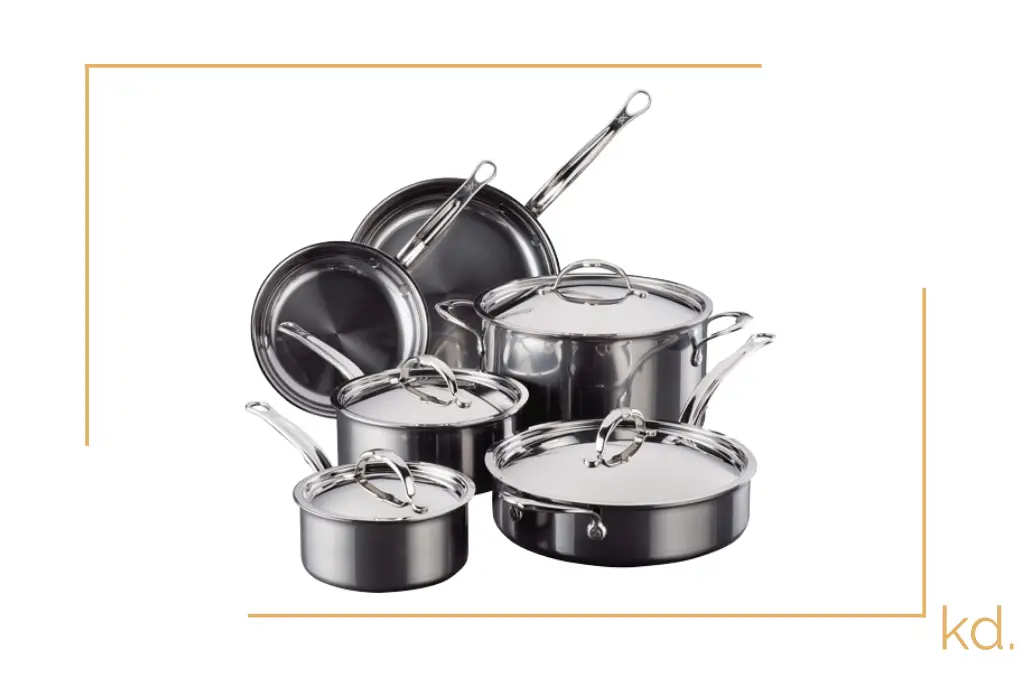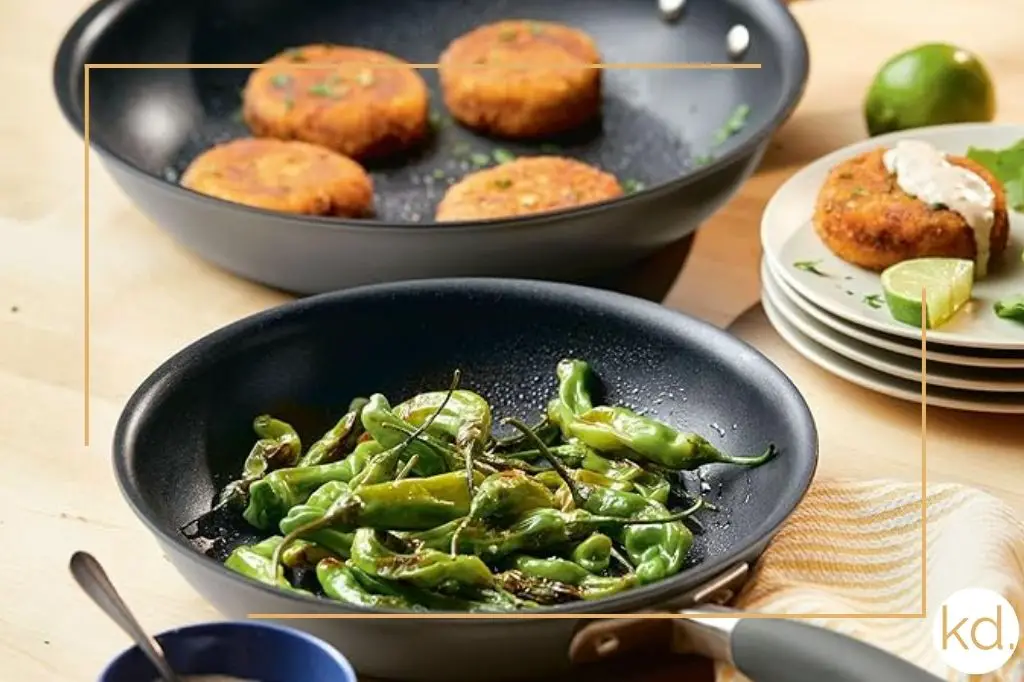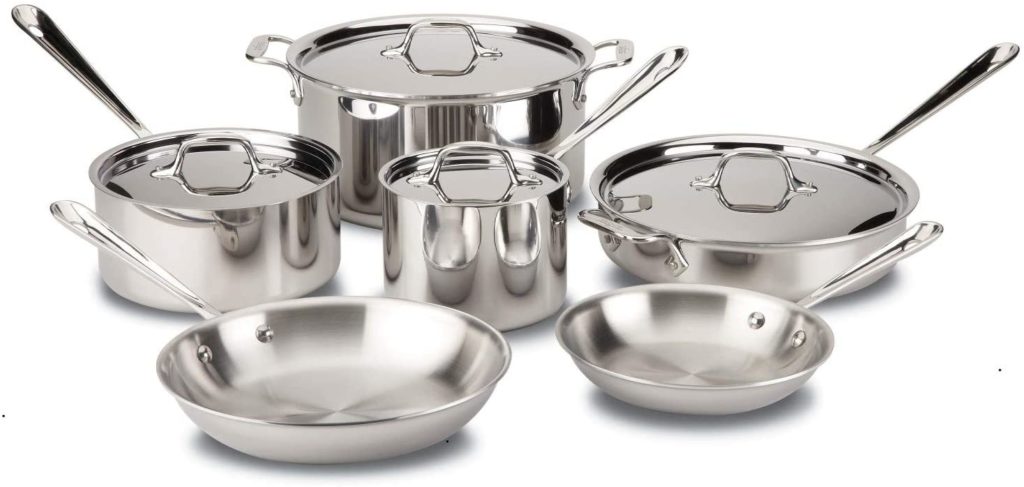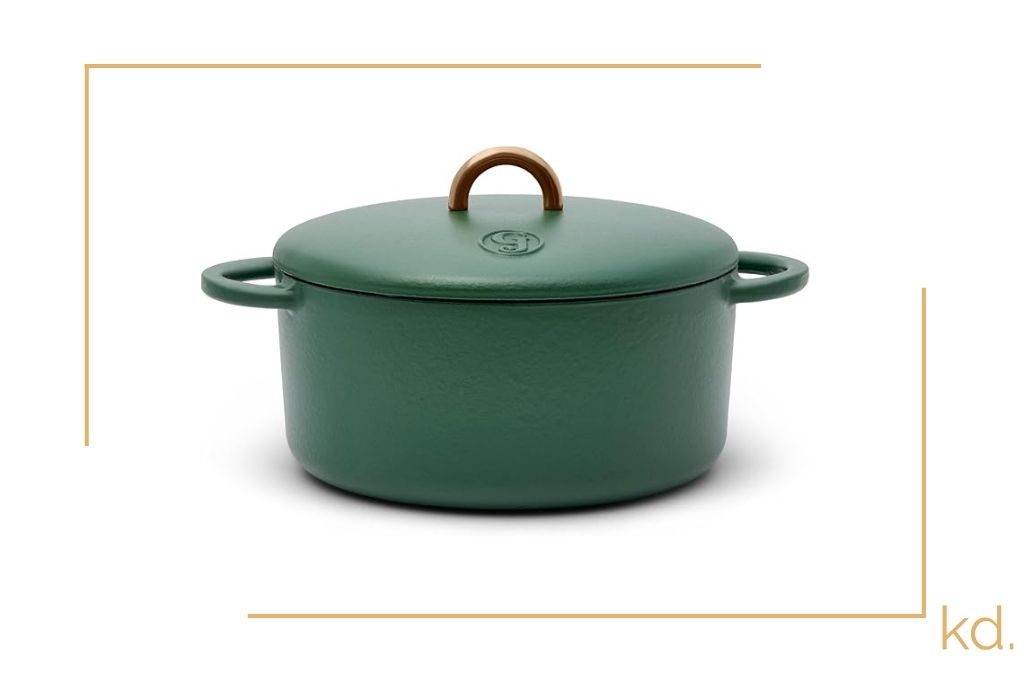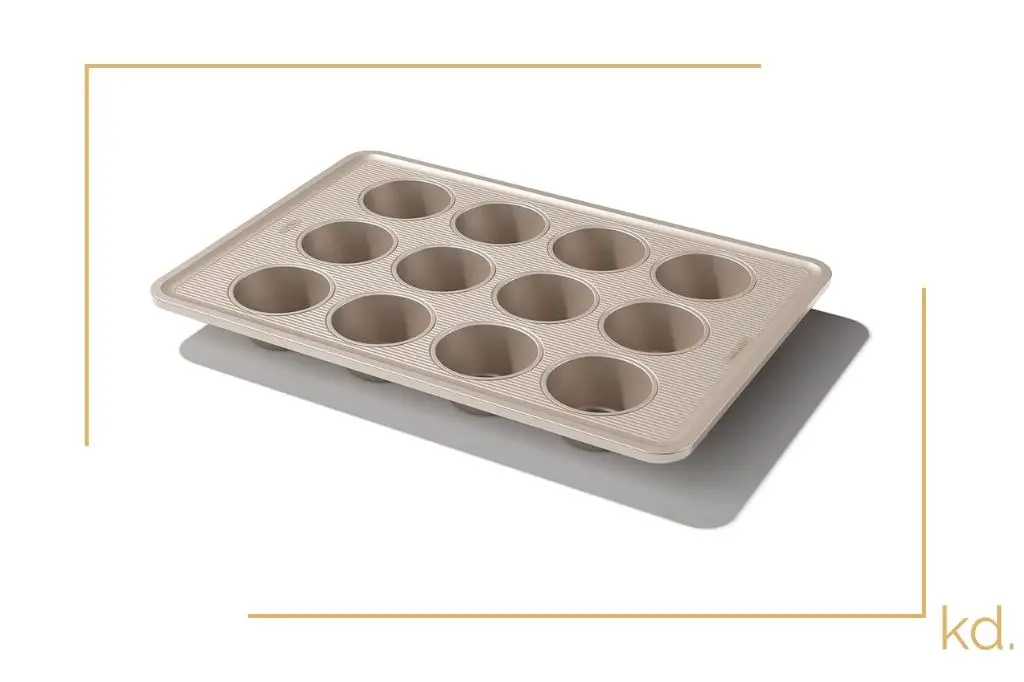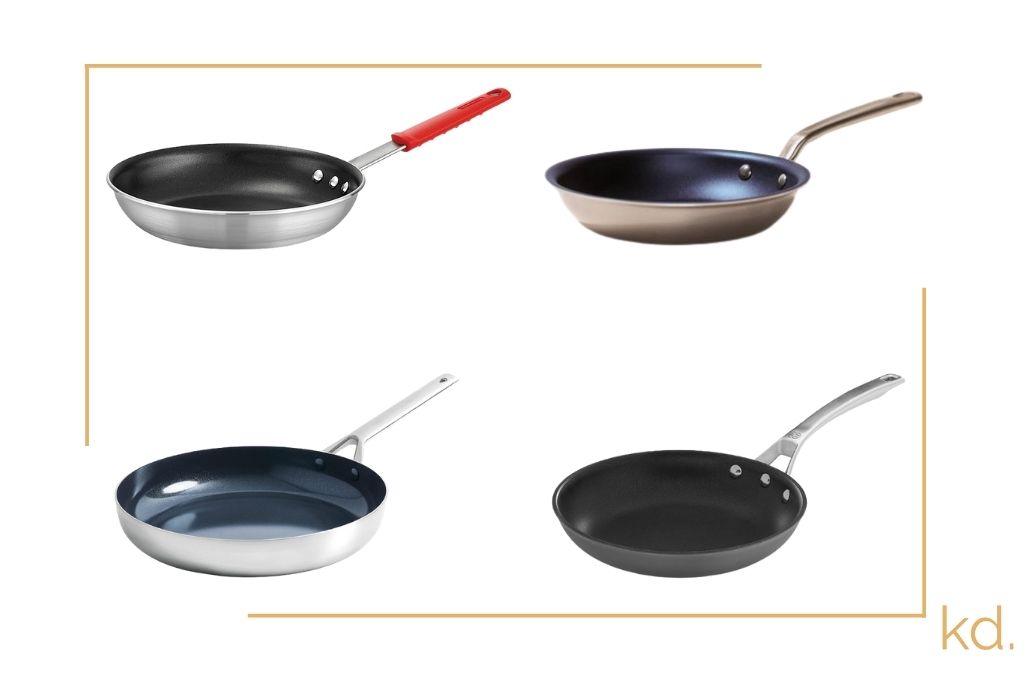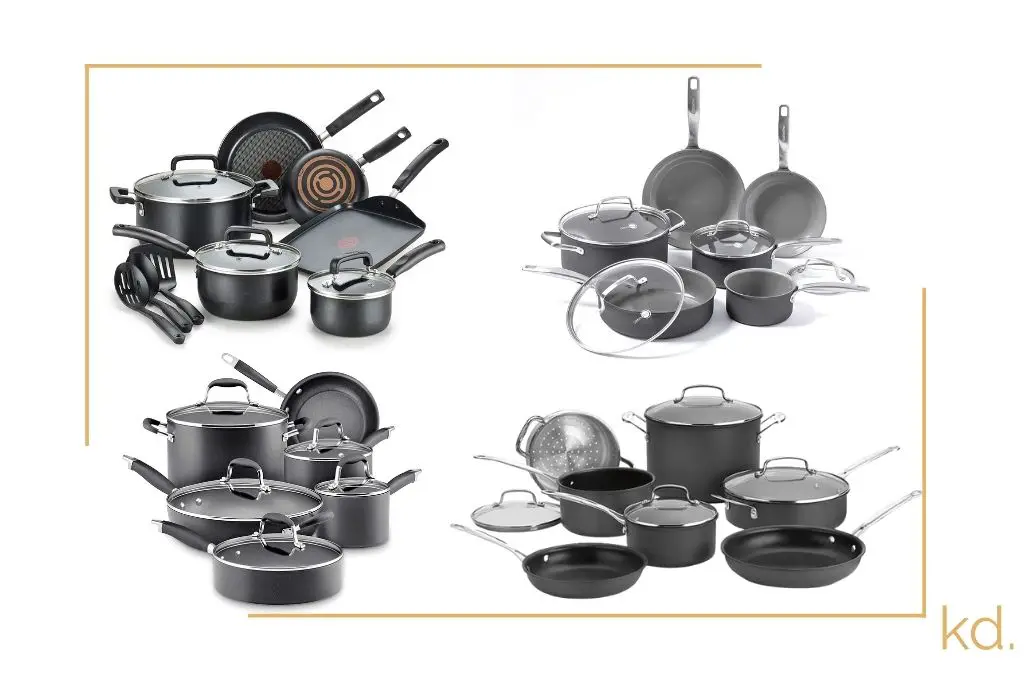Commercially-made titanium cookware has several benefits that make it an appealing option for some people, but also some disadvantages that might mean it’s not the right choice.
In this blog post, we will discuss the pros and cons to consider when you’re deciding whether or not titanium cookware is the right choice for you and your kitchen. Let’s get started!
Use links below for easy navigation
What is Titanium Cookware?
Pure Titanium Cookware
Titanium reinforced Cookware
Titanium Cookware Pros and Cons
Titanium Cookware Pros
Titanium Cookware Cons
Bottom Line
What is Titanium Cookware?
Titanium cookware is made of pure titanium with silicone ceramic coating, and titanium reinforced cookware that has an aluminum base.
Pure Titanium Cookware
Titanium is the lightest metal on earth, and it’s incredibly strong. It can withstand temperatures up to 570 degrees Fahrenheit (298 degrees Celsius). That’s why it’s used in heat-resistant surgical tools, and even in high-end jewelry. It’s also why titanium cookware is so popular: it can withstand high heat without warping or losing its shine.
Pure titanium cookware has a silicone-ceramic coating, which makes it scratch-resistant and easy to clean.
The silicone ceramic coating on pure titanium cookware allows you to use this cookware on any type of heat source that would absorb all the heat generated by cooking food; as such, this type of cookware is much lighter than regular stainless steel or cast iron pans but still retains durability and nonstick properties.
Related: Cast Aluminum Cookware Pros and Cons
Titanium Reinforced Cookware
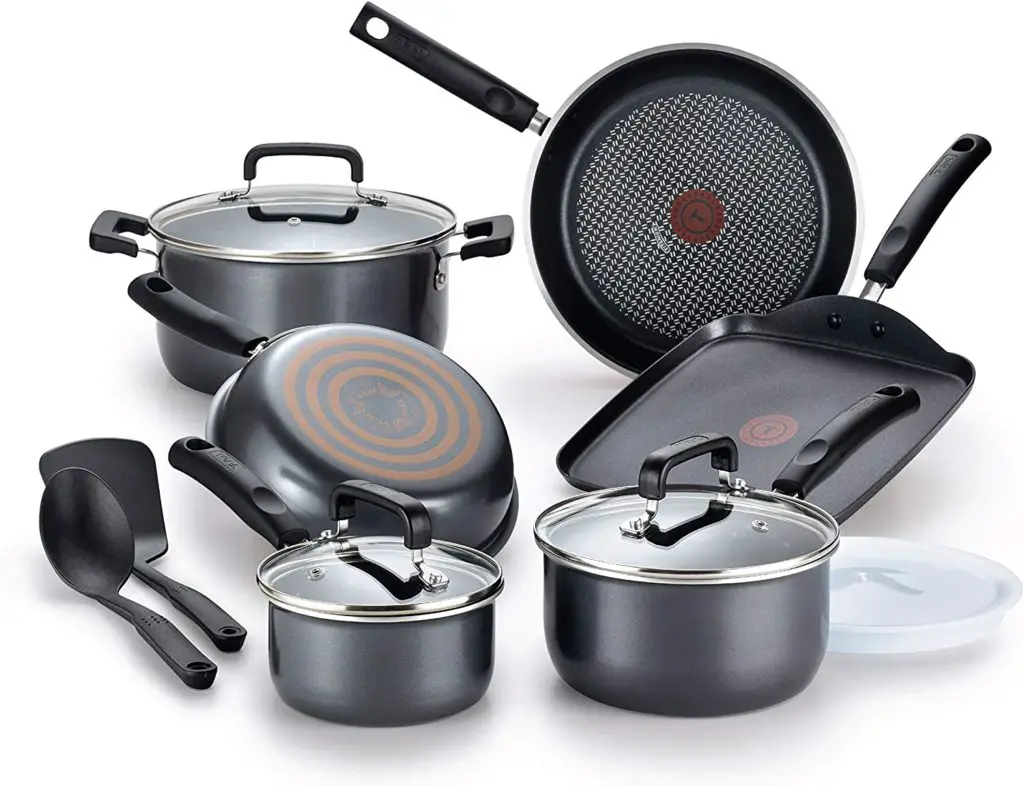
Titanium reinforced cookware is made of a thick aluminum base and a thin layer of titanium coating. The aluminum base makes it more durable than plain titanium, but it also absorbs heat better than plain titanium.
This type of material is more durable than regular titanium cookware, while still being lightweight and durable.
Titanium-reinforced cookware comes in a variety of different forms. You’ll find some titanium pots and pans with nonstick coating—some brands also offer stainless steel versions of their nonstick pans with an aluminum base for increased durability and strength.
Related: Granite Cookware Pros and Cons
Titanium Cookware Pros and Cons
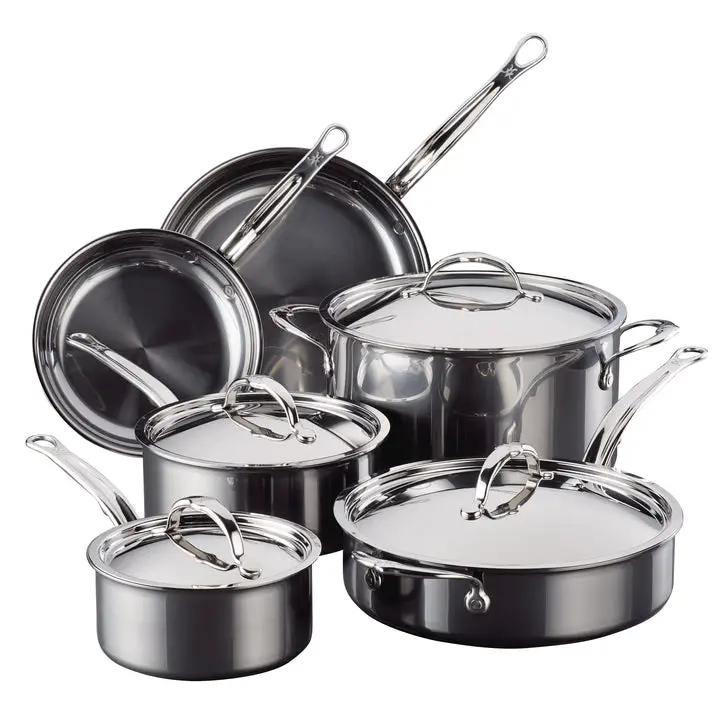
One type of cookware that you’ve probably heard a lot about recently is titanium cookware. This type of cookware has many advantages, including durability, heat retention, and non-reactivity with food.
However, it does have some disadvantages that you should consider before making your purchase, such as decreased heat distribution and a high price point.
Related: Carbon Steel Cookware Pros and Cons
Here are the pros and cons of titanium cookware to help you decide if it’s right for you!
Titanium Cookware Pros
Titanium cookware is a great choice for you if you want to lose weight or just take care of your health. Titanium cookware has so many benefits, let’s discuss them below.
Lightweight:
Titanium is incredibly lightweight, so you won’t feel as weighed down while cooking in it.
The lightweight nature of titanium means that it’s much easier to carry around compared to stainless steel or cast iron pans. You can even use titanium pots with induction ranges, which means no more hot water spots!
Healthy cooking:
Titanium cookware is a healthier choice than traditional cookware. Titanium surfaces have a higher heat capacity, meaning that they can withstand high temperatures longer before they start to melt. This means you won’t have to worry about dishes sticking and burning on your titanium pan.
The titanium also has a high resistance to heat and will not react with foods or liquids. You can cook more delicate foods like eggs or fish in it.
Related: Marble cookware pros and cons
Scratch Resistant Surface
The surface of the titanium cookware has been treated with a nonstick coating that forms a protective layer on the surface of the metal which prevents scratches from occurring during normal cooking activities such as stirring boiling water on the stovetop or moving pots around while cooking
Related: Best Pots for Boiling Water
Flexibility:
Titanium is extremely flexible, which means that it will bend without breaking instead of cracking or shattering when you try to bend it too far!
You can use titanium pans on all types of stovetops because they don’t get hot enough to burn the food or cause the pan itself to melt.
Faster Cooking Time:
Titanium cookware has faster cooking times due to its higher heat capacity and less surface area per volume than other metals, so you’ll be able to prepare food faster without having to wait around for long periods of time as your food cooks through.
Additionally, titanium doesn’t react with foods like other metals do—meaning you can cook in the same pan for longer periods of time without having to worry about burning your food.
Durability
Titanium is a very durable material that can withstand high temperatures and is also resistant to scratches. It won’t wear down as other metals do. This makes it an ideal choice for a cookware set that will last a lifetime.
If you’re looking for something that’ll last you for years without needing much upkeep or maintenance, titanium cookware should be at the top of your list of kitchen essentials!
Related: Enameled Cast Iron Cookware Pros and Cons
Versatility
Titanium cookware has a great deal of versatility when it comes to cooking because it can be used on gas stoves as well as electric ones. This means that you don’t have to worry about which kind of stove you have because you’ll be able to use the same pan for both types of heat sources!
Does not rust or corrode
Since titanium does not rust or corrode when exposed to moisture, it is an excellent choice for use in outdoor cooking environments where corrosion from other metals could cause damage over time.
Related: Brass Cookware Pros and Cons
Titanium Cookware Cons
Titanium cookware has many cons, but it’s still a great choice for anyone who wants to cook with the highest-quality material. Here are four drawbacks to consider before buying titanium cookware:
It is expensive.
Titanium is an expensive metal, and it’s cookware is not exactly cheap, either. You’ll probably have to spend between $200 and $300 on a set of titanium pots and pans when all is said and done.
Uneven heat distribution
Uneven heat distribution is another issue associated with titanium cookware; while this may not seem like much at first glance it can lead to unevenly cooked foods if left unchecked.
This can be frustrating when cooking at high temperatures or in small spaces where there isn’t much room to move around. This can also lead to uneven browning of foods due to uneven heating as well as cooling down quickly after use so that food doesn’t stay warm longer than necessary.
Cools down quickly
Titanium cookware is designed to maintain even heat distribution within the pan, so there are no hot spots or cool spots—but that doesn’t mean it will stay hot for long periods. If you like fast-cooking meals or need your food to stay warm after cooking, this can be an issue because the pan won’t hold its temperature for long periods on top of being an extra-expensive option in general!
Cleaning can be an issue
Titanium has a reputation for being hard to clean out between uses—but this can be easily remedied by using a brush and some soapy water to scrub away any burnt-on food bits before rinsing thoroughly with hot water.
This isn’t such an issue if you only use one pan at a time but if you plan on using multiple pans over time then having them cleaned regularly may be necessary to avoid rust forming on the surface of your pans which could cause them to crack over time (which means they’ll need replacing sooner rather than later).
Is titanium cookware safe?
Titanium cookware is completely safe to use. Titanium cookware has been used by chefs all over the world for decades because it performs well at high temperatures and can withstand extreme heat. It is a very durable metal, and it’s resistant to corrosion, meaning it will not rust or tarnish.
This makes it an ideal choice for people who spend most of their time in the kitchen.
Can titanium handle high temperatures?
Titanium has a low coefficient of expansion, which means that it doesn’t expand and contract as much as other metals do when heated. This makes it ideal for cookware because it can handle high temperatures without warping or cracking.
Bottom Line
The benefits of using titanium cookware are numerous, but it’s important to keep in mind that no cooking tool is perfect, especially not one with so many different uses as this one. Hopefully, with careful consideration and research, though, you can decide whether or not this type of cookware will work well for your needs
